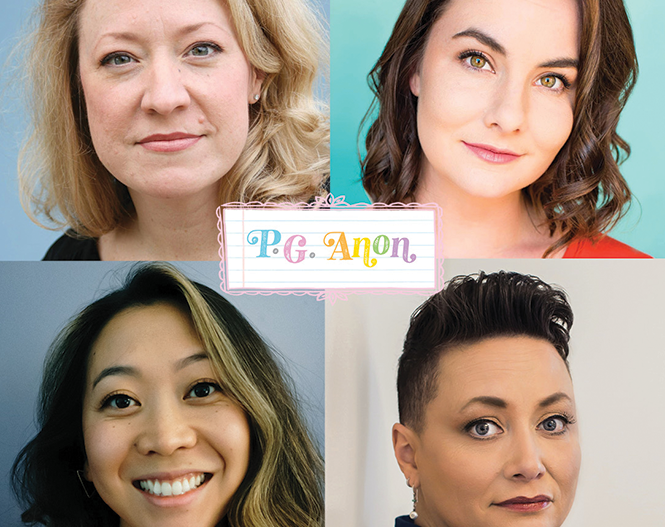Sound Judgment
Plan-B Theatre Company opens an audio-only season with P.G. Anon.
By Scott Renshaw @scottrenshawEveryone has had to adapt during the pandemic. For playwright Julie Jensen, that meant taking a play that had been written as a profoundly visual stage experience and adapting it so that it could work as an entirely audio performance.
Jensen's P.G. Anon opens a unique season for Plan-B Theatre Company, which decided to deal with the ongoing COVID-19 pandemic by transitioning to a full slate of audio dramas. The company had just announced its next season in early 2020, and was beginning to sell season subscriptions, when it became clear that things would definitely not be normal. That was when artistic director Jerry Rapier and managing director Cheryl Ann Cluff began to consider a radical notion based on the company's history of annual radio-drama productions.
"We'd had conversations about our 30th anniversary, then all those plans had to be cancelled," Rapier says. "But that left us with the realization that the first Plan-B radio show was 25 years ago. For 25 of our 30 years, we've been playing around with radio drama. ... So we needed to lean into that. The minute we started talking about it, lightbulbs went off. It was a big relief to know we could do this thing.
"Little did we know then how many challenges would rise up."
For Julie Jensen, that included the challenge of taking P.G. Anon and almost entirely reimagining it. Inspired by a conversation with a friend about the anxieties of being a woman constantly fearing unplanned pregnancy, the show was designed to feature a small cast all playing multiple characters, with their stories taking an often-fanciful form. When Rapier reached out to Jensen about the notion of going audio-only, Jensen wasn't sure P.G. Anon could work.
"I talked to [Rapier] about not doing it," Jensen says. "I didn't know if we could make it even passable. I talked to him about doing a different thing. He kept saying, 'I think you can do this, just try it.' I did have experience adapting other things, but they weren't at the outset so weirdly different. And it was hard. The whole pandemic, I worked on this."
According to Jensen, virtually everything in the original incarnation of P.G. Anon required revision. "It all had to be changed in a way," she says. "I didn't lose it all. But things got readjusted, characters got dropped. ... It exists in two forms now."
Despite her reservations, Jensen acknowledges that there is a sense in which the play was improved by virtue of needing to shift the focus to something that could work exclusively on the basis of vocal performances. "I like the characters better," Jensen says. "I got so enamored with the use of the ensemble, and it was so exciting to mess around with that, that I sometimes got distracted, showing off. It now tells the story better, I think. I think it connects to lived experience. The other was theatrical and showy, and kind of fun to experience, but this carries the weight."
Once the text was in place, there was still the matter of creating the audio production. And while it would seem that Plan-B's history with its "Radio Hour" shows would make that the easy part, it turned out not to be the case. The "Radio Hour" shows were always performed live, with the entire cast working together in the same space—something that simply wouldn't be possible to remain compliant with best health practices and guidelines established by Actors Equity. "We only got permission to continue with our production if we could guarantee that we wouldn't ask any actor to leave their home," Rapier recalls. "That's really complicated when you're building to finishing your production in a recording studio."
Instead, sound engineer David Evanoff developed a method for recording each actor individually. "David figured out how to build these little miniature recording stations," Rapier says. "For each one of [the actors], I dropped off a bag of stuff ... that contained everything needed to record at home. We use an audio slate to record, then take eight audio tracks, line them up from the slate marker and weave them together.
"Once we got over the hump of the fear," Rapier adds, "we discovered opportunities that we wouldn't have had otherwise. We could instantly re-record something, we can fix some of those little bobbles that actors sometimes wish they could fix on stage."
While everyone longs for the opportunity to get back on stage—and Jensen acknowledges the reality that people listening at home are likely to be more easily distracted from the work than if they were in a darkened theater—Rapier is thrilled that they were able to come up with a way to get theater people collaborating, after a time when the opportunity to work safely has been extremely limited.
"We're happy to be able to offer some employment, but there's also the joy of working on an artistic project together that's been missing from everyone's lives," Rapier says. "It's been a year since most people have had that experience."
More by Scott Renshaw
-
Feature film review: THE BEAST
A filmmaker's compelling ideas get a bit tangled in references to his creative influences.
- Apr 17, 2024
-
Faces of Salt Lake County book and portrait reception
Images and personal stories in a new book reveal local demographic diversity
- Apr 17, 2024
-
Film Reviews: New Releases for April 12
Civil War, Escape from Germany, Coup de Chance, Hundreds of Beavers, La Chimera, Sting
- Apr 11, 2024
- More »
Latest in Arts & Entertainment
Readers also liked…
-
New TV for January 2023
Mayfair Witches, Velma, The Last of Us, Poker Face and more premieres
- Jan 4, 2023




